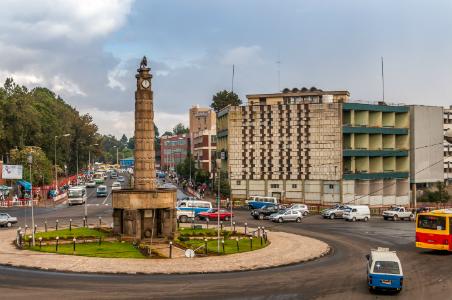
Tell your friends you're off to Addis Ababa, and the response might be “Addis…where?” But just because the Ethiopian capital isn't at the top of travelers' must-visit lists doesn't mean you shouldn't go. In fact, this slightly under-the-radar city of 3.5 million people has much to recommend in it, and the good stuff isn't mobbed by hordes of tourists.
For one thing, compared to other cities in the region, Addis (as everyone calls it) is very safe. Sure, people will warn you to watch out for pickpockets, especially at busy markets and public areas, but terrorism and violent crime are not big dangers here. In recent years, the city has become a hub for diplomatic missions (making it a great place to secure visas for onward travel to other African countries); meanwhile, upscale hotels, restaurants, and a forthcoming light rail are sprouting up.
As such, Addis feels very much under construction. There's dust everywhere, but also sunshine, jacaranda trees, and a promising feeling that this is a city on the rise. All the more reason to visit before its particularly Ethiopian charms (which are numerous) are subsumed by the sameness of global luxury. Speaking of what's charming, below are five reasons to visit Addis now.
Recommended Fodor’s Video
A Taste of Ethiopian Food and Culture
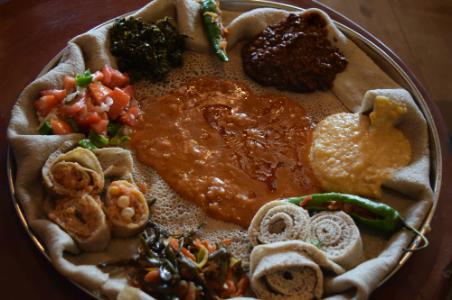
If you've tried Ethiopian food before, you know it's a memorable cuisine whose signature spongey bread, injera, is used in lieu of silverware for mopping up various spiced-up stews. Sadly, the wonders of injera—which is meant to be springy, light-bodied, and mildly tangy, like sourdough—are often lost in translation. (Outside of Ethiopia, rice flour is frequently subbed for the traditional teff grain, resulting in a heavy bread that sits ponderously in the stomach.)
Though hotels and tourist restaurants tend to be dominated by Western food, it's worth going out of your way to have at least a few excellent traditional meals. It's worth noting that Wednesdays and Fridays are “fasting days,” meaning most people don't eat meat. Unless you're at a tourist establishment, it's better to order vegetarian those days to avoid less-than-fresh meat.
Yeshi Buna started as a coffee shop (buna means coffee) but thanks to its excellent food, it now has a handful of restaurants around town. The branch near Meskel Square is situated in an old wooden house, with each of the rooms serving as a small, intimate dining room peppered with half a dozen tables. To get a taste of everything, try the bayenetu, a sort of sampler platter that can be ordered with meat or vegetarian: six or seven stews and other dishes are arrayed on a large round of injera.
At first glance, it might seems strange to recommend Abyssinia, since in most parts of the world it would be considered a major tourist trap. Here, strangely enough, the concept is “touristy” (you eat and drink while watching costumed performers knocking out traditional dances), but the clientele is 95 percent locals. It turns out Ethiopians really, really love their own culture (as in clap-and-cheer-and-jump-onstage-to-dance-along love their culture). The whole spectacle is entirely worth witnessing, with a cold St. George beer in hand. Abyssinia has pretty good food, too: If you're feeling adventurous, try the kitfo, minced raw beef mixed with clarified butter and spices (think of it as Ethiopian beef tartare), served with breads for dipping plus a fresh local cheese and cooked greens known as gomen.
However, the best option for getting a taste of Addis is to sign up for a tour with Addis Eats, a two-year-old company run by an American, Eliza Richman, who grew up steeped in Ethiopian culture thanks to a nanny who hailed from Addis. Richman and her fellow guides lead small groups for a comprehensive taste of the city's edible offerings, from a typical juice shop to a coffee ceremony (more on that below), to a vegetarian restaurant and a meat or fried-fish place (depending on the day of the week). Along the way, you'll receive priceless insights into local culture and culinary customs.
Terrific Coffee
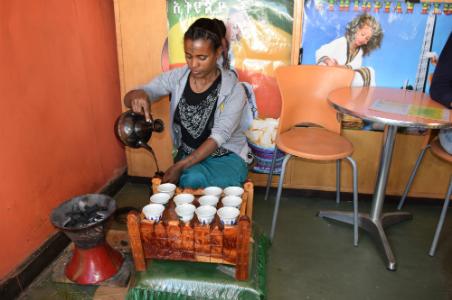
Ethiopia is sometimes called the world's best coffee country, and it might well be: Not only do some of the choicest beans on the globe grow here, but there's also a serious coffee culture. You can find excellent Italian-style espresso thanks to Mussolini's failed 1935 invasion of Ethiopia (a major point of pride here is that the country has, in fact, never been colonized). The best place for a strong, creamy macchiato is Tomoca, a local chain with several branches around Addis. Aim to hit the original, in the lively, walkable area known as Piazza, where you'll see many people enjoying coffee and conversation.
The other more traditional way Ethiopians enjoy their java is in what's called a coffee ceremony. This is how you might drink a cup if you're invited to someone's home, but many shops and restaurants offer it as well. Freshly ground coffee is brewed in beautiful, ornate urns over a charcoal brazier, then poured into small cups, where it's typically enjoyed with some sugar (you need it since the brew is so strong) and no milk. Incense is generally burned at the end of a coffee ceremony. It's a lovely ritual, and a good excuse to take a sightseeing break.
Excellent Markets and Shopping
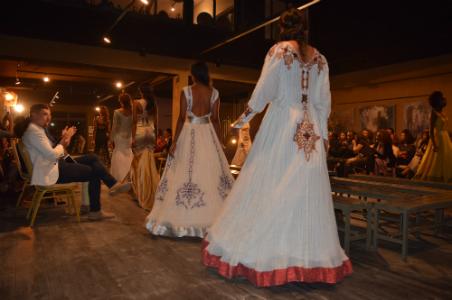
Ethiopia has a long tradition of beautiful handicrafts including high-quality hand-woven, embroidered, and bespangled materials. You can also find leather goods like sandals and hats. In fact, Addis is such a fashionable place that it recently hosted a fashion week, Hub of Africa, showcasing the works of Ethiopian and other African-born designers.
The largest market in town, Merkato, is almost a city unto itself, with different “districts” offering different types of goods: clothing, food, cookware, incense, and many other excellent souvenirs, some of it wholesale-only. If you're interested in the spectacle, by all means check this place out—just be sure to take along an in-the-know local and hold tight to your valuables.
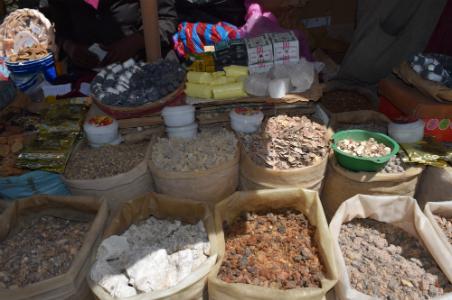
If you'd simply like to shop for some nice wardrobe additions, Shero Meda is the best market for the gorgeous, hand-woven blankets known as gabis, and beautiful Ethiopian cotton dresses. And for a general market experience without the craziness of Merkato, Shola is a smaller, very pleasant little market offering a mix of things—food, textiles, etc. Addis Eats recently started offering guided visits to Shola, if that sounds appealing. For a glimpse of a small factory where scarves, blankets, baskets, and other handicrafts are made, pay a visit to Salem's sunny courtyard and workshop, where you can drink a cup of tea with the kind Salem herself and maybe find a scarf to bring home as a souvenir.
A Hopping Jazz Scene
In the 60s and 70s, Ethiopia became known for its own brand of jazz, but the music scene was entirely shut down during the communist regime that lasted from 1974 until the early 90s. Since then it's made a comeback, and Addis is now an excellent place to hear jazz and other live music. Check what's playing at Jazzamba, one of the best venues in town, which opened in 2011 in the former ballroom of the historic Itegue Taitu Hotel (known casually as Taitu). Between sets, be sure to pop into the hotel itself, which is funky and charming, with a whiff of bygone glamour, and hosts rotating art exhibits on several floors.
“13 Months of Sunshine”

It's pretty much always sunny in Addis. And since Ethiopia has its own calendar with 13 months instead of 12 (the details are very ancient and complicated), the local joke is that the country boasts 13 months of sunshine. That means the weather is nearly guaranteed to be pleasant no matter what time of year you want to go.
Jenny Miller is a freelance writer based in New York, and a former editor at New York Magazine's Grub Street. Her work has appeared in Departures, Bon Appetit, New York Magazine, and many others. She loves NYC eating excursions, Southeast Asia, and hanging out with other people's dogs. Follow Jenny on Twitter and Instagram: @jennyhighlife.


